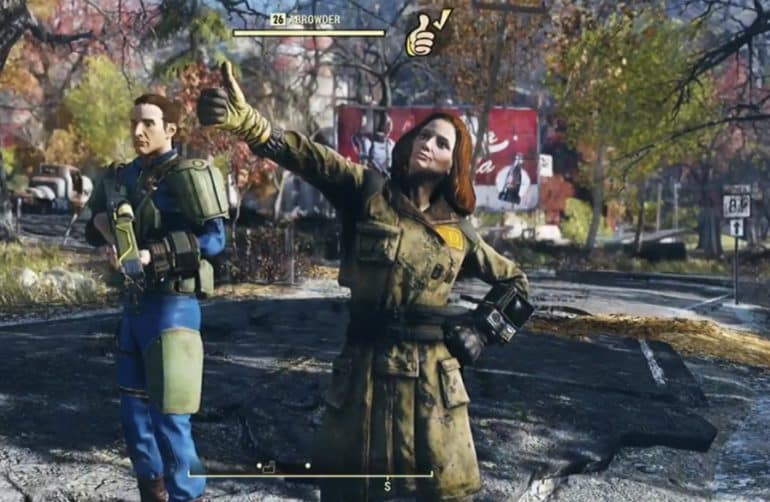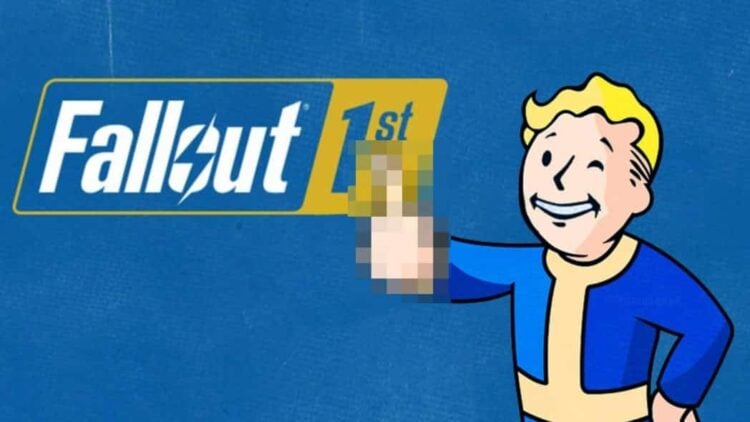2018 has been an annus mirabilis, or Year of Wonder for AAA-budget Open-World titles. Sitting over here in November it can feel like January was several decades ago, so let me just run through the list of impressive releases to support this claim of mine – Monster Hunter World. Kingdom Come: Deliverance. Far Cry 5. God of War. Spider-Man. Assassin’s Creed Odyssey. Red Dead Redemption 2. Some of them are better than others; plenty of them with flaws still present, but all in all, for the Open-World fan such as myself, I found myself overwhelmed with more playtime hours and exploration in games this year than I can remember having in many previous ones.
The final title this year along this theme and one that should have capped off the year in a satisfying way for this journey should have been Fallout 76, the always-online experiment in the Fallout FPS-RPG franchise. I will be blunt – not only was it a disappointment to me to play, but I also found myself even more disappointed when I remembered how much marketing and budget had gone into this title. This was not some minor studio with a dream vision that got stuck in early access. This was something from one of the powerhouse studios that practically owned this genre a few years ago. While hype is always present during marketing, I feel that most of the other titles I listed here are delivered to some degree or another. Fallout 76 did not.
Other reviews have summarised the game to greater extents and explained how it works and its various features, so I will not cover the same exact ground again to the same extent here. So let me try and instead compartmentalise my criticisms, some of which are obviously more opinionated and some of which are more factually based. I shall leave it up to my ever-observant reader to analyse them in those departments.
What Makes a normal Fallout compelling, and why doesn’t that work in Fallout 76?

For myself, and with many people I speak to, a typical Fallout title is fun to play through because of the setting, tone, and engagement with the world. It is a post-apocalyptic retro-futuristic wilderness that takes place with the survivors of a decades-past nuclear holocaust. It has charming throwbacks to a 1950s aesthetic and is quintessentially American, often criticising and honouring in equal measure the feeling of what it means to be American in such a context. The tone can vary between horrifying and darkly comedic during questlines. You often notice that the survivors of this new world repeat the same mistakes made before the apocalypse and that, ultimately, humans are always going to be the same.
In short: War… War Never Changes.
Enter you as the player. In a typical Fallout title, you get given a grand central quest that guides you, and as you follow it, you encounter people and places that lead you into side objectives, factions and other smaller details in the world that you engage with. You can choose to engage in quests or ignore them, but your choices and decisions, even just to partake in one quest or another, shape your world to your own design. A Fallout, and even an Elder Scrolls, game is very player-focused. This is your world, you are the most important person in it by virtue of being the player character, and the world bends to your will as you explore around.
There is none of that in Fallout 76. The always-online nature of the game means that everybody’s quests will always pretty much be the same, with the only difference being whether you team up with another human player or not to achieve them, which adds nothing to the narrative itself. Furthermore, there are no NPC’s in the game.
Your main plot is that you are following in the tracks of people who have come before you, and every time you reach a new place, you find that everyone there is dead, and you receive missions via robots or recordings or some other impersonal method. Most of these quests are variations on fetch quests. In a normal Fallout, these types of ultimately simple quests could have been made more exciting by making you care about the stakes as they affect living NPCs, but because here you are only serving the voice of dead people, I found it very much harder to care about what I was doing.
The lack of NPCs is almost unforgivable to me, and it creates a game that, to me, is actually not Fallout, despite having all the outward appearance of one. I will talk more about that later, but for now, let me emphasize – no dynamic companions, no larger or smaller settlements that show how people have rebuilt after the end, and no memorable personalities to enjoy spending time with your adventure. Just a very cold, lifeless world, filled with you and 23 other humans on your server, all very much detached from you and your journey.
When A Unique-Selling-Point Doesn’t Come Together
Fallout 76 has a unique selling point (USP) that perhaps sounded good on paper but led to further issues and concerns that I believe were not fully considered. This USP is that your Fallout world is now always online and filled with you and 23 other human players on your own personal server. You can team up and create allies dynamically with real people or attack them and take their resources, although there are punishments attached for such behaviour.
I have already spoken about how this USP affects the game narratively and thematically in the section above, but I will now discuss it in a gameplay sense. In a perfect world, where I had 2 or 3 friends who always played this game at the same time as me and with whom I could know I was getting a quality team-up, this system in the game would work better. But I believe it is unreasonable to expect this for most players, and with the random people of your world, it works far less well.
There are firstly some technical compromises that damage my experience. Everything must happen in real-time, so VATS, the slow-down special targeting system of the previous titles, is vestigial at best. In this game, it takes the form of an aim-bot that runs for a couple of seconds to improve your shot, but most of the time, the percentage chances of a shot vary so quickly in real-time motion that it becomes more effort than it is worth. However, where it goes from being an appendix to being an inflamed and infected appendix is when you realise that the rest of the game generally runs the same as previous titles like Fallout 4, so you will get into a combat situation where you realise that VATS from Fallout 4 would have been perfect, but alas, it is not here anymore, and you suffer for it.
Next, because the game is always running, you do not have the capacity for instant-resting, saving or quick saving. This is almost an essential feature in any Bethesda game because of the number of game-breaking glitches and bugs (which I shall speak more about just now), but it also means that the ability to experiment with different outcomes is taken away from you.
While a system such as this works in titles such as the Souls series, in that game, it is both thematically and gameplay-involved right from conception. Here, once again, you are essentially playing Fallout 4 or 3, but with this feature removed.
A small not-really-a-consolation is that because the quests are so much simpler anyway, you don’t really need to look for multiple playthroughs of quests. Small comfort indeed.
During my time playing this game, in both Beta and Final releases, I had one memorable experience with a quite nice human player, and we did a couple of quests together. Otherwise, I would go ages without seeing a human, only to see one briefly run past me before disappearing into the wilderness again. The value we get from having human players exclusively in this title does not replace the value given to us by well-designed NPCs with stories and motivations designed by professional writers. A 12-year-old yelling profanities over the open mic is not a substitute.
Technical Failings and Unneeded Additions – The Case for Fun
When I mentioned earlier why people generally like Fallout, I did not mention that people do so for the gameplay, this is an important point to note. The gameplay is a way of interacting with the world that you care about more so than what you are actually doing to engage with it. And, to be honest, the actual feeling of attacking and fighting and shooting in these titles has always been borderline simplistic, with a floaty and imprecise feeling throughout. In short, you do a heck of a lot of shooting and hitting, but the shooting and hitting do not feel very good compared to other games which have done it better, and this was true even in Fallout 4.
Melee combat feels a lot like Skyrim still, a game which is now 7 years old, and it is even worse here in 76 because of the always-online state. When a game from 2011 plays better than one from the same company in 2018, that is a problem. Precision was specifically always a problem in combat, with it being hard to see if you were actually hitting something properly until the health bar went down, and in this title, the slightest hang-up on the network side or the internet side can leave you feeling like you’re playing Morrowind again in 2002, with dice-rolling hits. And there are lots of moments when the network bugs out from the server side.
This also leads us back to how improper conceptualising creates more problems than you realise at first – the floaty gunplay was understood as early as Fallout 3, and what was the solution there? VATS, for tricky situations that you could use as a tool that also left you feeling empowered as the player. As aforementioned, VATS has been scuppered here and is hardly the same thing, leaving you with a worse combat system and the already existing remedy removed.
Moving on now, Fallout 76 overall is trying to present itself as much more of a survival game now because we definitely need more of those (sarcasm). Aside from the usual Health, Stamina and Rads meters, you now have Food, Water and increased Degradation of Armour and Weapons. Managing all of these is a chore. Furthermore, I have never played a game where I enjoyed weapon degradation, and smart games understand that if you want to include it as a mechanic, you do so in such a way that it does not leave the player feeling like a constant anxious worry-wart over their basic tools and weapons for play.
I have alluded to but must emphasize again the presence and damage done by bugs and glitches. Commenting on bugs in a Bethesda game is like criticising Nintendo for having a lot of Mario games, but the fact is that the huge variety of bugs and glitches, especially at launch, are more able to be overlooked in the single-player games because you have more solutions at hand.
You have the ability to control your save games in those, but it is taken away in this one. If you die because of a glitch, you reload your game with very little loss, unlike here, where you are forced to respawn. Hell, you could even fix some of the bugs yourself in previous games with custom patches and mods, at least on PC. Also, playing co-operatively becomes almost impossible if one player is affected by a game-breaking bug. In short, once again, a typical problem for this company has been emphasized and reinforced, and again, I shall say this: the pre-existing solutions have been taken away because of such adherence to the USP, which at this stage is not giving us much at all in return for this sacrifice.
The final point I shall mention here is the cash shop – so far, it is cosmetic only, and it is definitely an industry-wide move, but I still hate it. I feel the constant threat of micro-transactions looming over a game just diminishes it even more. When you see a player running around with an item from the cash shop, you are instantly reminded that you are playing a game. You are not part of an adventure that has sucked you into it, you are reminded in a cynical fashion that you are engaging with a product and that you are the consumer.
Faint Praise – What Did I Like About Fallout 76?
In fairness, let me bring forward the few points I did like about Fallout 76. The setting of West Virginia is beautiful, graphically and in design. There were a lot of texture pop-ins and low-quality textures in buildings, but overall, it was quite pretty to look at.
I like the Base-Building mechanic: it doesn’t do a lot that is new, but it does provide the chance for customisation and personalisation in your quest. I usually love such titles.
The nuclear launch mechanic is quite interesting – in short, you can gather together codes through great difficulty and teamwork that allow you to launch a nuke at an area, temporarily changing it into a higher level and visually different area for a period of time. A nice dynamic impact on the world.
In short, Fallout 76 is not, to me, a Fallout game. It is your typical early-access-survival game with base-building attached. It’s Rust, it’s Conan Exiles, it’s Ark. It’s a million different Steam titles that never went anywhere, and this time, all it’s done is slap a Fallout skin over the top and add in some more quests than you normally get in such titles.
In essence, it is a fair-to-middle survival game in comparison to the trash we normally see from that genre, but it is a terrible Fallout game. It has sacrificed too much in attempts to create this experiment of a game, and in doing so, all it has done is remove what did work in the series before now and cast the existing problems with the series into sharper focus for all to see, with nothing now to compensate for those faults.
It’s a million different Steam titles that never went anywhere, and this time, all its done is slap a Fallout skin over the top and add in some more quests than you normally get in such titles.
Fallout 76 is a disappointment to me in the truest sense because of it being a Fallout game – the franchise was the albatross around the neck of the game that it couldn’t escape. A new IP would have been different and better in my mind. If it wanted to be a co-op multiplayer shooter, ala Destiny, it could have been that. If it wanted to be a survival-base-builder, it could have been a really good one of those. And if it wanted to be a cooperative real-time RPG, it could have been that, too. Instead, a franchise and gameplay engine wholly unsuited for this job was co-opted for brand recognition and a pre-existing market. Perhaps it was even just to be able to reuse assets, and while I hesitate to bring up charges of laziness being a priority, it may well be the case.
When scored here, all this damnation from me may make it seem like the merely average scores I give here are contradictory. However, at the end of the day, it is still a fairly competently made game, with all the tens of millions that went into it.
As a final note, people often say that games like these get better after a couple of years of content addition and patching. All I can say in response to that is that my time with Fallout 76 has made me thoroughly unlikely to ever come back to it.
RELATED: Monster Hunter Wilds Review – An Early Game of the Year Contender
Fallout 76 is a disappointment to me in the truest sense because of it being a Fallout game – the franchise was the albatross around the neck of the game that it couldn’t escape.
















